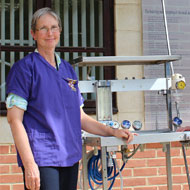
Animal Health Trust hands over anaesthesia machine to assist clinical skills training
The Animal Health Trust (AHT) has donated an anaesthesia workstation to the University of Cambridge Veterinary School to help with clinical skills training.
The Newmarket-based veterinary charity donated the vital piece of equipment after work got underway to refurbish the AHT Small Animal Centre theatre and vets at the facility wanted to see the workstation go to a good home at an education facility.
The station is fully functional and will assist in the teaching of anaesthesia and analgesia practices - including how to do an anaesthetic machine safety check - to undergraduate vets studying at the university veterinary school in the Pauline Brown Clinical Skills Centre, itself a new acquisition for the university.
The centre will include a dedicated instructional room with interactive models and simulators for training and self-study. As such, it will play a crucial role in the students’ learning experience by allowing them to practise essential technical skills over a wide range of disciplines in a low-stress environment, and enable them to become proficient with procedures and equipment before using these on animal patients.
Colette Jolliffe, head of anaesthesia at AHT, said: “With our ongoing theatre refurbishment, this anaesthetic machine would have no longer had a home here. So it seems only right that we should pass on the equipment for others to benefit from it, as we, and countless animals, have done so for so many years. We are absolutely thrilled to hear that the Cambridge Vet School will be able to make use of it for educational purposes to help train the next generation of vets."
Dr Jackie Brearley, director of studies for veterinary medicine at Lucy Cavendish College and academic lead in the Pauline Brown Clinical Skills Centre, said: “Being able to include the anaesthetic machine, generously donated by the Animal Health Trust, will ensure that the students are able to familiarise themselves with this crucial and complex area of veterinary medicine, which plays an essential role not just in the theatre environment but also with many diagnostic techniques and to enable the administration of treatments.”
Image courtesy of AHT



 The Greyhound Board of Great Britain has published new vaccination guidance, with all greyhounds registered from 1 January, 2027 required to have the L4 leptospirosis vaccination, rather than L2.
The Greyhound Board of Great Britain has published new vaccination guidance, with all greyhounds registered from 1 January, 2027 required to have the L4 leptospirosis vaccination, rather than L2.